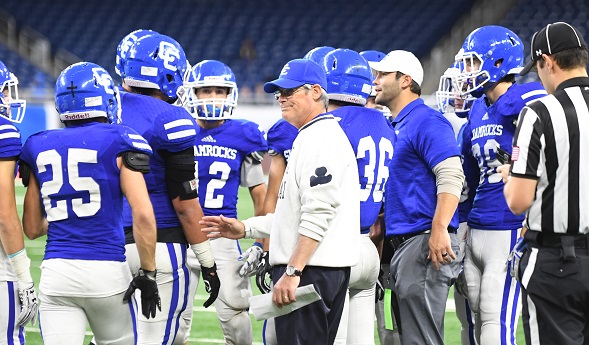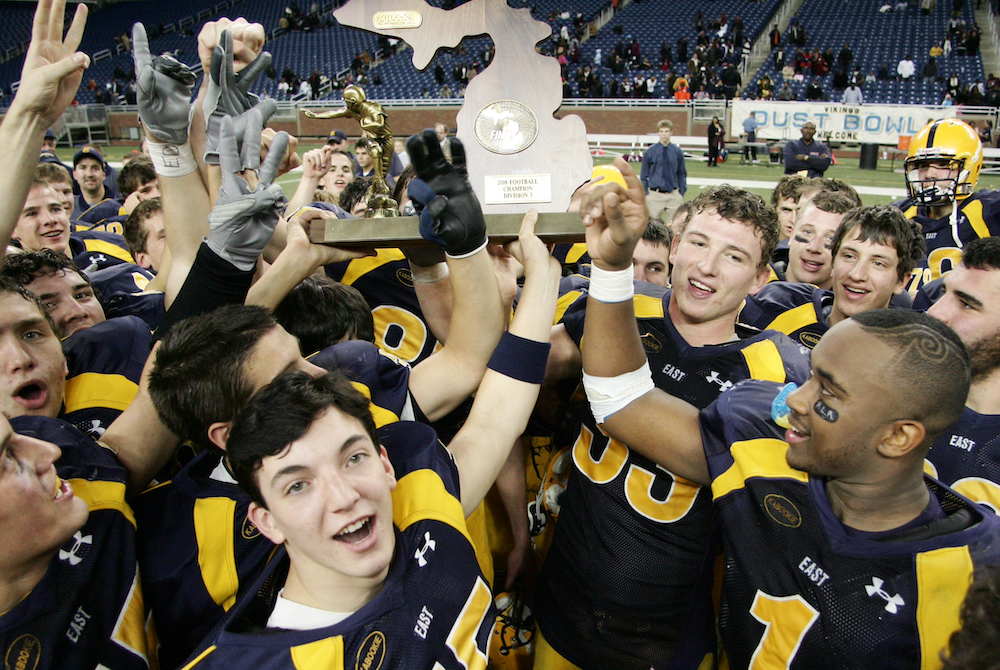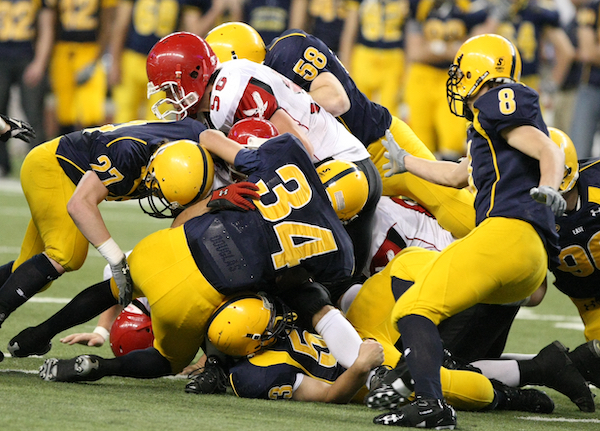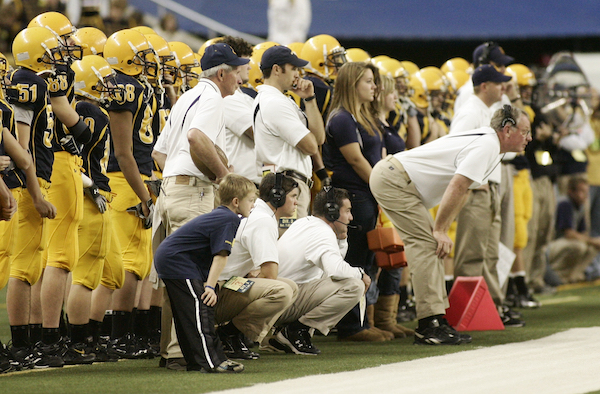
DCC's Mach Builds Legacy Sure to Live On
By
Tom Markowski
Special for Second Half
March 20, 2017
NOVI – Tom Mach’s impact on the Detroit Catholic Central football program didn’t end with his retirement Feb. 9.
 The aftershocks will be felt for years to come.
The aftershocks will be felt for years to come.
Mach and C.C. football have become synonymous over the past 41 seasons. The double tight end, three-back backfield, sometimes lined up in the T-formation, is the offense we’ve been accustomed to watching game after game, year after year, so much so that it’s become a blue thread woven through the fabric that is high school football in this state.
But times change. Coaches move on, and new ones are hired.
Mach, 69, had been contemplating retirement for some time and the reasons to do so gathered momentum after the Shamrocks lost to Detroit Cass Tech, 49-20, in the Division 1 Final in November.
“You’re not as inspired as you used to be,” Mach said. “I’ve gone back a couple of times on my decision. It wasn’t an easy decision. It was real hard. I prayed real hard that God would tell me what to do. It’s stressful. People count on you. I finally said to myself that you have the confidence that the next guy would carry on with what we did here.
“My first meeting with the players (at C.C.) was in 1976. I remember writing the speech. I thought of that. The 41 years and all of the things that came in between.”
When Mach wrote his last speech he incorporated what C.C. football meant to him and to the players he coached. He tried to reassure the players that the program, and what it is today, will remain so the next day and the day after that.
“The actual doing it was hard,” he said. “It was the hardest speech I’ve ever done.”
Mach was hired in 1976 after gaining experience as an assistant coach at Southgate Aquinas. He never thought administrators at C.C. would hire him. In his mind, why would they? He had no experience as a head coach, and he thought the experience of going through the hiring process would benefit him when he applied somewhere else. To Mach’s surprise, he was hired.
C.C. went 8-1 in Mach’s first season. He said that success was crucial for him and his staff to win over the players and administration. Had C.C. finished below .500, the future might have been different for him. As it was, the players warmed up to his way of coaching, and three years later the Shamrocks won the Class A title, the first of 10 under Mach.
“The first thing I thought of when I got hired was, how am I going to fair against guys like (Birmingham Brother Rice coach) Al Fracassa? If I make it five years, I’ll be happy,” Mach recalled. “What was good for me, the team I inherited was talented. I had written a book on football and my philosophy but there are always questions. I was thankful for that (initial success). Once that happened, the next group would buy into it. I did the same thing. I have a good group of guys coming back. I wanted to leave a good legacy for the next guy. Having that good start made people believe in my philosophy.
“We did it. We never changed anything. We proved it in the way we handled things, and the kids bought into it. We did it the right way.”
Last weeks, DCC did hire that “next guy” – Shamrocks defensive coordinator Dan Anderson, who was promoted to take over the program after working 20 years under the longtime mentor.
But the initial shock of not being the person in charge will take time to sink in for Mach. What he will lean on to make this transition as smooth as possible are his family and friends.
Mach fought with this decision, but what made him make it at this time was his family, notably his wife, Lynn. His wife had knee replacement on Jan. 10, and on April 4 she is scheduled to have the other knee replaced. Whether it’s hip replacement, knee replacement or any similar type of surgery, the process is painstaking, and the person going through it must have someone close to assist in the process.
Being that person, Mach knew this would take time away from coaching his team in the offseason had he chosen to stay. Lynn had physical therapy sessions three days a week, and the other four Mach would assist with the therapy at home.
In the end, it would have been too difficult to do both.
“I have to be her coach,” he said. “After (the knee replacement) I was with her two weeks, every day. I don’t think I’ve ever done that before. Fourteen days. But we did it.”
Mach said Lynn is recovering well and is anxious to have the other one done.
The Machs will spend much of their free time at the summer home just south of Gaylord. Though not a fisherman or hunter, Mach does enjoy the outdoors. Snowshoeing is one hobby he enjoys as well as taking walks, often long walks.
To add to his activities, Mach has a brother who lives in Williamsburg, just outside of Traverse City, and his sister lives near Gaylord.
They will enjoy the peacefulness that place provides, but they’ll remain residents in southeast Michigan. Their two sons, Mike and Joe, both assistant coaches in the football program, live in the Detroit area. The Machs have one granddaughter with another grandchild on the way.
“(Lynn) won’t move anywhere,” Mach said. “We have friends here. This is our home.
“It’s always great when I’m up there, and it’s always tough to leave. Now we’ll have more time to go there and won’t be in such a hurry to leave.”
Mach said he’ll remain in contact with Catholic Central and the people who have been so much a part of his life over the years. He’ll go to games and root for the Shamrocks from his seat in the stands.
To give back to the sport, Mach said he will consider speaking at clinics or schools if asked. He mentioned that Ferris State University and Royal Oak Shrine have made contact with him on such matters.
Mach’s resume is as impressive as any coach. His teams won 10 MHSAA Finals titles and seven other times reached championship games. Those numbers are staggering. In 41 seasons when a Tom Mach-coached team began practice in August, more than 41 percent of the time it would reach the last game of the season.
He also ends third on the list of career coaching victories. His record is 370-94. Only Fracassa (Brother Rice, Shrine) with 430 and John Herrington at Farmington Hills Harrison (425) have more.
But Mach was never keen on talking about his accomplishments. For him, success was measured by the development of his players – physically, mentally and spiritually – and the respect they showed for the game.
“Throughout my life, I’ve been lucky,” he said. “It was a hard decision when you work with people so long. The school is great. The people are great. They all inspired me. It’s the people I’ll miss. You become a coach because you love it.
“I love C.C. I want them to do well. I want them to make sure the kids here have every opportunity to win.”
 Tom Markowski is a columnist and directs website coverage for the State Champs! Sports Network. He previously covered primarily high school sports for the The Detroit News from 1984-2014, focusing on the Detroit area and contributing to statewide coverage of football and basketball. Contact him at [email protected] with story ideas for Oakland, Macomb and Wayne counties.
Tom Markowski is a columnist and directs website coverage for the State Champs! Sports Network. He previously covered primarily high school sports for the The Detroit News from 1984-2014, focusing on the Detroit area and contributing to statewide coverage of football and basketball. Contact him at [email protected] with story ideas for Oakland, Macomb and Wayne counties.
PHOTO: Detroit Catholic Central retiring football coach Tom Mach led his team to one last MHSAA Division 1 Final in the fall, against Detroit Cass Tech at Ford Field.

EGR 5-Year Title Run Remains Awe-Inspiring, Product of More Than Talent Alone
By
Steve Vedder
Special for MHSAA.com
November 25, 2022
It was Peter Stuursma's first year at East Grand Rapids and while the wolves weren't necessarily knocking at the door, they were definitely on the prowl.
The tradition-rich Pioneers football team had slumped to an uncharacteristic 3-6 record in Stuursma's first season as varsity head coach in 2000, and there were subtle signs a community used to winning was growing restless with the program's direction.
That's when Stuursma bumped into one of his players coming out of the weight room, and the two had a quick conversation which he clearly remembers 22 years later.
"It was this senior offensive lineman and all he said was, 'Don't worry about it Coach, it's not going to happen again. We got this,’" Stuursma said. "We had just gone 3-6, and I'm wondering how we're going to get this going and that they might get rid of me. You never underestimate what people can do."
East Grand Rapids, under legendary coach George Barcheski, had been the dominant football program in West Michigan with 28 winning seasons over 29 from 1970-99, and 38 victories in 39 games from 1993-95, along with Class B championships in 1976 and 1983. After Stuursma replaced the retiring Barcheski,, some in the community were expecting more of the same when it came to success.
Those fans never dreamed what they would see as the Pioneers promptly pieced together arguably the greatest decade-long stretch in Michigan high school football history – and without doubt one of the most incredible five-year runs of dominance.
Even that optimistic offensive lineman couldn't have imagined a remarkable 126-7 record over the next 11 years, a 40-3 MHSAA Tournament mark and seven Finals championships. Five of those titles (2006-10) came in a row, a feat accomplished just three times in the now 46-year history of the playoffs.
 The five straight championships were part of an amazing era that Stuursma and his players say has not diminished with time. They recall no single factor explained going 67-3 overall over those five seasons. There was talent, obviously, but coaching, tradition, confidence and strength of community all played vital parts. There were Thanksgiving practices attended by hundreds of former football alumni, dedicated fan support that included playing before more than 30,000 fans at least twice at Ford Field, and a program-wide attitude that, while some may call it a cliché, proved that success did indeed breed success.
The five straight championships were part of an amazing era that Stuursma and his players say has not diminished with time. They recall no single factor explained going 67-3 overall over those five seasons. There was talent, obviously, but coaching, tradition, confidence and strength of community all played vital parts. There were Thanksgiving practices attended by hundreds of former football alumni, dedicated fan support that included playing before more than 30,000 fans at least twice at Ford Field, and a program-wide attitude that, while some may call it a cliché, proved that success did indeed breed success.
"I'm in awe of the scope of things," said Stuursma, whose team used back-to-back Division 3 championships in 2002-03 as a springboard to later success. "Because we had won a couple times before it just started to feel normal. We had such support the community used to think Thanksgiving break ended at Ford Field."
EGR teams would find all kinds of ways to win during the five-year title stretch. The 2009 team, for instance, barreled through its first four playoff opponents by a combined score of 164-29 until a 24-21 win over Orchard Lake St. Mary’s in the Final. The 2010 team had to win three playoff games by eight points or fewer to finish off its perfect 14-0 record. And then there was the wild 46-39 five-overtime win over St. Mary's in the 2007 Final during which the Pioneers had to score on all five possessions in overtime to outlast the Eaglets.
While teams always seemed to find ways to get the victory, former players remember what it was like to be part of a seemingly endless tradition of success on the football field.
"One of the things that was so special about East Grand Rapids were the expectations," said Luke Glendening, a running back on the 2006 team who has gone on to a long NHL career with the Detroit Red Wings and Dallas Stars. "During the game I'd look around and see guys who had played here a long time ago. I viewed it as a privilege to have the opportunity to play before the alumni and community."
Quarterback Ryan Elble, who completed a combined 34 passes for 483 yards and seven touchdowns during the 2008 and 2009 Finals, also used the word "honored" to describe his high school experience.
"The culture was to win. Coach Stuursma made it fun, and it always seemed to take shape on the field," said Elble, who went on to play baseball at Miami (Ohio) "I think each team had different skill sets, but at the end of the day it was our culture and putting in the work to spend Thanksgiving weekend at Ford Field."
The players point to that winning culture over talent. Elble said he played with only one eventual Division I college player in linebacker/running back Trent Voss, who went on to Toledo. Nobody wins without talent, of course, but they point to many other factors as being just as critical. Because EGR coaches would always work juniors into the lineup, Stuursma said the program faced only one major rebuild, in 2007. That team wound up 13-1 and the second of those five straight champions.
 "We had some incredible players," said Stuursma, who left EGR in 2016 to lead Hope College to two Michigan Intercollegiate Athletic Association titles, three second-place finishes and a 46-15 overall record over his seven seasons. "We returned only two starters (in 2007), but we still had good guys who wanted to win."
"We had some incredible players," said Stuursma, who left EGR in 2016 to lead Hope College to two Michigan Intercollegiate Athletic Association titles, three second-place finishes and a 46-15 overall record over his seven seasons. "We returned only two starters (in 2007), but we still had good guys who wanted to win."
The players say the culture started with Barcheski and the program's tradition. As Hope College's coach, Stuursma said there’s a similar common thread among schools he sees on recruiting visits: a winning tradition that, in Stuursma's words "screams excellence," from every corner of the building. He sees it the minute he walks into some schools, and East Grand Rapids had the same culture before he arrived. The past players say it played a major part in their careers.
That tradition didn't start with the five straight titles, said former quarterback Kyle Cunningham, who played on the 2002-03 teams and went 46-0 over four years from his freshman to senior seasons. Those two championship teams’ most recognizable player was running back Kevin Grady, who still holds multiple MHSAA records including for career rush yardage and went on to play at University of Michigan.
"We worked hard and had a lot of pride," he said. "I remember watching film of earlier teams, and I remember hoping our team could stand up the same way."
While the players point to tradition and community, Ryan Blair, a tight end/defensive tackle on the 2006-08 champion clubs, said talent remained critical – but EGR was outmanned physically in some of those title games. That's when camaraderie and the confidence that someone was going to make a key play took over. The Pioneers' remarkable run was teeming with such plays.
"Certainly we were never one of the biggest teams there, we never had a big size advantage in any game," he said. "But we had this camaraderie on every team. We had guys who really liked playing with each other. When things got tight we stuck together, and we'd fight to the fourth quarter or beyond."
Despite the long odds of winning a single state title let alone repeating, Stuursma believes there could be a team one day which wins six straight. That team will have the same characteristics of those EGR teams – the talent, coaching, tradition and fortune of catching timely breaks – but it can be done, he said.
"Absolutely," Stuursma said. "The only record I can think of that won't be broken is Wayne Gretzky's (NHL) scoring record. It will take a lot, but records are made to be broken. I think high school football is on the upswing and there would have to be an emphasis on winning. You would have to have a good path to get there, but I can see someone getting six one day."
PHOTOS (Top) East Grand Rapids celebrates its third-straight Division 3 championship win in 2008. (Middle) Pioneers converge on an Orchard Lake St. Mary’s ball carrier during the 2007 five-overtime title decider. (Below) EGR coach Peter Stuursma, kneeling center, monitors the action during the 2010 championship game.

